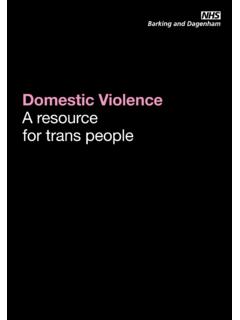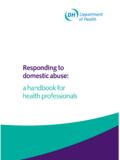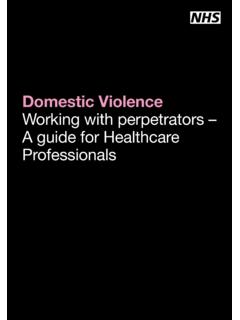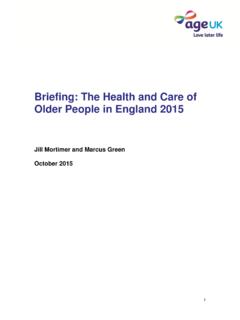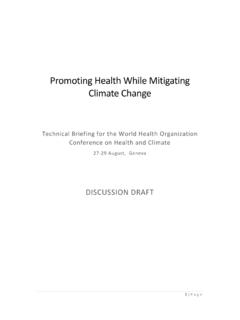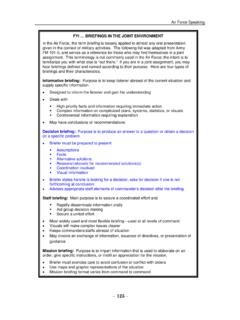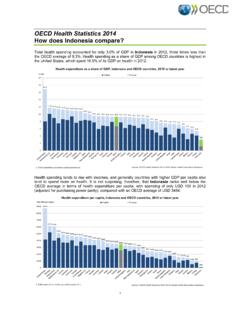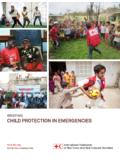Transcription of Domestic Violence A briefing for Healthcare …
1 Domestic Violence A briefing for Healthcare ProfessionalsAs health care professionals, we are privileged to play a unique and important role in the lives of our patients. We are entrusted with the opportunity and responsibility to explore with our patients any number of concerns that could adversely affect their our role as health care providers, we routinely ask patients some highly personal and sensitive questions regarding sexual practices, dietary indiscretions, cigarette smoking and substance abuse. We may feel awkward or embarrassed; however, we broach these difficult topics with our patients because our goal is to provide information and support that can help our patients optimize their term Domestic Violence describes a continuum of behaviour ranging from verbal abuse, through threats and intimidation, manipulative behaviour, physical and sexual assault, to rape and even homicide.
2 The vast majority of such Violence , and the most severe and chronic incidents, are perpetrated by men against women and their children. Those who experience Domestic Violence often keep it to themselves - shamed and embarrassed by what is happening to them; unsure of where they can go and what help they can get, and fearful of doing anything which might make the situation worse. A briefing for Healthcare ProfessionalsDomestic Violence affects people regardless of race, ethnicity, class, sexual and gender identity, religious belief, age, immigration status and ability. Abuse is a health care issue that impacts people of all ages, including children, adolescents, and the elderly; its impact can manifest throughout the lifespan. Domestic Violence has serious health consequences. The impact of Domestic Violence on individuals health and well being is substantial: psychological and psychiatric problems such as depression, anxiety, despair, post traumatic stress disorder, suicide attempts etc are higher among those who have been abused, compared with those who have not.
3 Physical injuries are also common and include bruises and abrasions, fractured bones, lost teeth, internal injuries, gynaecological problems and miscarriages. Whether in general practice, dentistry, health visiting, nursing, maternity services, psychiatry and mental health care , general medicine and surgery, or in Accident and Emergency care , health care professionals have daily contact with patients whose health is damaged by Domestic Violence , and who often face risks of further and more extreme is important that the issue of Domestic Violence is not ignored by health professionals if a truly successful health care response is to be briefing for Healthcare ProfessionalsIt is estimated that women on average experience 35 episodes of Domestic Violence before seeking who do eventually disclose their abuse to someone typically describe a history of long-standing and escalating Violence , and also remark on how much they wanted to be able to talk about what was going on.
4 If only someone had asked about Domestic Violence helps improve patient health and safety. Many victims of Domestic Violence interact with health care providers when seeking routine or emergency care . The Healthcare setting offers a critical and unique opportunity for early identification and even prevention of abuse. Yet, health care providers remain reluctant to inquire and assess for Domestic Violence , citing reasons ranging from discomfort, to lack of information on how best to support a patient disclosing abuse. Domestic Violence , undeniably, is a sensitive topic. However, asking a patient about an abusive relationship is no more difficult than asking patients about sex, drugs, and bowel habits! If you identify that a victim is at high risk make a referral to the MARAC- Multi Agency Risk Assessment Conference by contacting our MARAC Co-ordinator Allison Buchanan on 020 8227 2363 When questions are asked in a caring manner and with a stated reason ( Domestic Violence is quite common and therefore I routinely ask all my patients about it ), patients are not offended and will frequently say they are glad someone finally asked them about the patient and provider testimonies show that inquiry not only affirms DV as an important health care issue for the patient but also sends a prevention message that DV is unacceptable.
5 When providers inquire about Domestic Violence , they help patients understand the connection between the abuse, health problems, and risk behaviour. In addition, they also provide the victim with relief from the isolation they are likely to be help patients improve their options for health and safety by assessing for Violence , validating the patient s experience, performing a brief safety assessment, documenting the abuse in the medical record, and making referrals to Domestic Violence experts. It is really that simple. This is no more, and no less, than what we do for any other problem we find out is harmful to our patients professionals may have been reluctant to ask about DV because of a perceived lack of local services, however over the past ten years there has been a substantial expansion in services to support both people that are affected by, and involved in, Domestic Violence .
6 You, as a Healthcare professional can help address Domestic Violence as a health care issue! Here are some ways: 1. Commit to begin routine assessment for Domestic Violence at your health setting. Begin by trying routine assessment for one week. 2. Place victims safety cards in the bathroom, and/or exam rooms for patients who need information, but may not be ready to disclose. 3. Hang Domestic Violence posters in waiting areas to give patients the message that support is available. 4. Have Healthcare providers wear Is someone hurting you? You can talk to me about it badges. (NB these will be developed as part of the resource pack) 5. Organise a resource table and distribute patient education materials with phone numbers of local shelters, hotlines, and community resources for 6. Create a Domestic Violence protocol or review and amend an existing protocol for your health care Organise training for your staff on Domestic Violence intervention and Work with Domestic Violence programs in your community to let patients and the community know that your clinic, health care facility or health association cares about addressing Domestic Violence .
7 9. Consider writing an article on your experiences of patients experiencing Domestic Violence for the PCT Document assessment of Domestic Violence in Vision or Emis, you may want to use an abbreviation such as DVA in the record of the consultationTake action get involved!POLICE In an emergency contact the police on 999 National Domestic Violence Helpline 0808 2000 247 (24 hour helpline run by Women s Aid and Refuge) Provides access to 24-hour emergency refuge accommodation, as well as an information service, the helpline offers safety planning and translation Centre for Domestic Violence 0844 8044 999 or 08009 70 20 70 Free support to obtain injunctions from courtRights of Women 020 7251 8887 Free sexual Violence legal advice. Greater London Domestic Violence Project 020 7785 3860/1/2/3/4 Useful information for agencies responding to Domestic Violence available on their website HavensLondon s Sexual Assault Referral Centres- offer free medical help and advice, counselling and practical and emotional support Haven Camberwell 020 3299 1599 Haven Paddington 020 7886 1101 Haven Whitechapel 020 7247 4787 The Hideout An online resource for young people developed by Women s Aid Child line 0800 1111 Free and confidential helpline for children and young people in the UKThe Men s Advice Line Freephone 0808 801 0327 For men experiencing Domestic Violence The Respect Phoneline 0845 122 8609 For Domestic Violence perpetratorsKey contactsEveryman 020 7263 8884 Advice line for perpetratorsDomestic Violence Intervention Project (DVIP)
8 020 8563 7983 Violence Prevention Programme for men who are abusive to their partners or ex-partnersSurvivors0845 430 9371 Helpline for adult male survivors of child sexual abuse and adult rapeVictim Supportline0845 30 30 900 Provides information and support to victims of all reported and unreported crime, including sexual crimes, racial harassment and Domestic violenceJewish Women s Aid 0800 591203 Free-phone national confidential helpline for Jewish womenApna Ghar 0845 451 2547 Support for Asian womenTurkish Cypriot Women s Project 020 8340 3300 Advice service for Turkish Cypriot, Turkish and Kurdish women on all matters relating to Domestic violenceBroken Rainbow 08452 604460 National helpline for lesbian, gay, bisexual and transgender people experiencing Domestic Violence SOLA (Survivors of Lesbian Partner abuse) 020 7328 7389 Service for lesbian victimsLesbian and Gay Switchboard 020 7837 7324 Helpline for LGBT victimsMuslim Women s Helpline 020 8908 6715 and 020 8904 8193 Produced by Barking and Dagenham PCT October 2008
